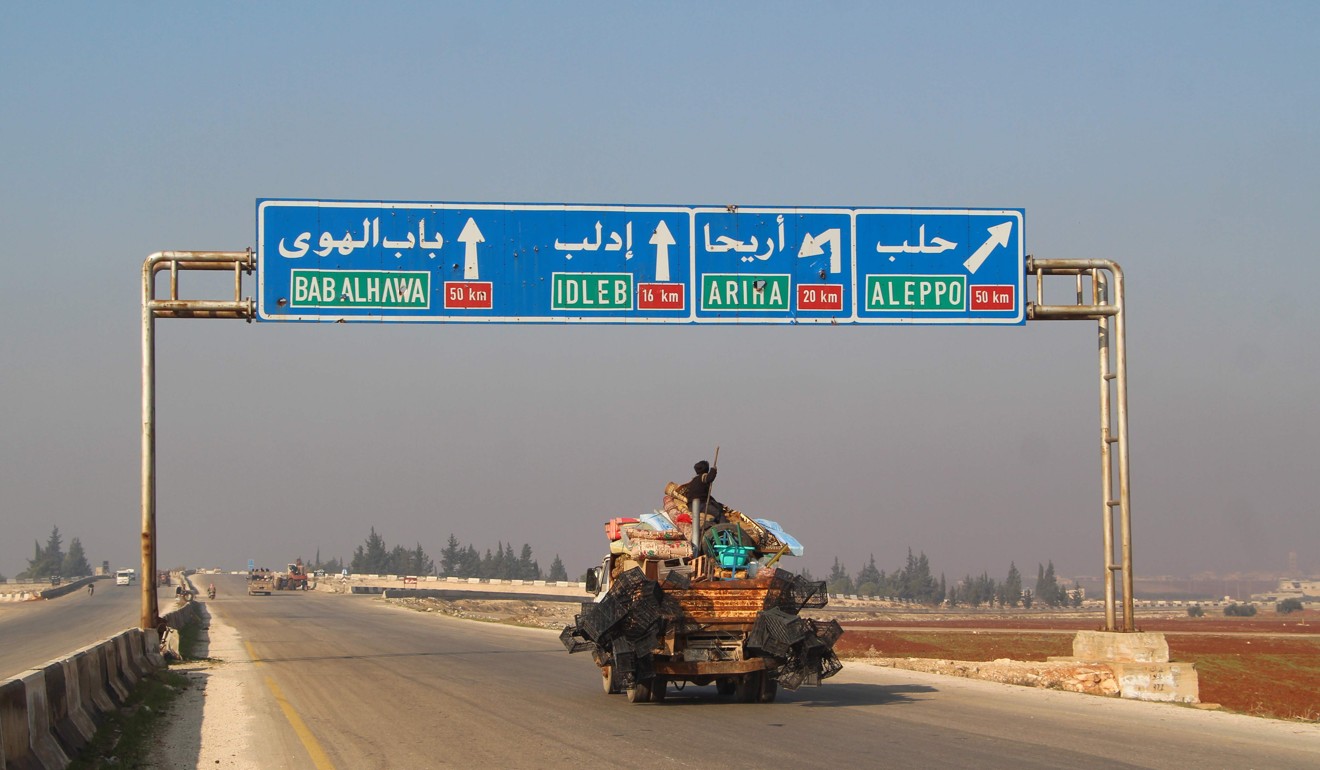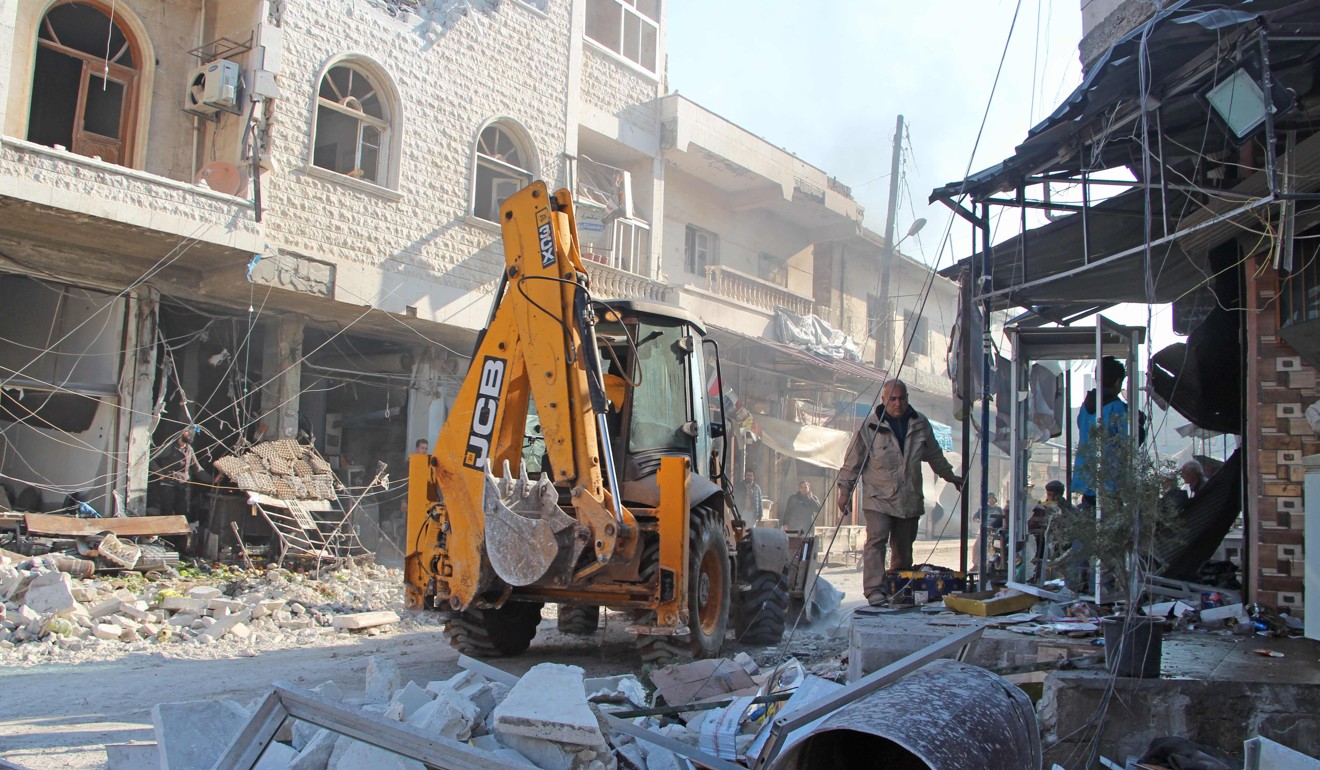
Pompeo pins blame on Russia, China as violence in Syria spikes and aid groups warn of imminent humanitarian disaster
- Tens of thousands have been forced to flee in the northwestern province of Idlib in the past week alone
US Secretary of State Mike Pompeo on Saturday said Russia and China had blood on their hands after the two countries used a veto of a UN Security Council resolution to block cross-border aid deliveries from Turkey and Iraq to millions of Syrian civilians.
“The Russian Federation’s and China’s veto yesterday of a Security Council resolution that allows for humanitarian aid to reach millions of Syrians is shameful,” Pompeo said in a statement.
“To Russia and China, who have chosen to make a political statement by opposing this resolution, you have blood on your hands,” he added.
Russia, backed by China, on Friday cast its 14th UN Security Council veto since the start of the Syrian conflict in 2011.
A surge in violence Saturday left 12 civilians dead in Syria’s last major opposition bastion as aid groups warned of a humanitarian catastrophe if cross-border aid stops reaching the region.
Heightened regime and Russian bombardment on the northwestern province of Idlib since December 16 has already forced tens of thousands of vulnerable people to flee their homes, according to the United Nations.
The world body has called for “immediate de-escalation” and warned of further mass displacement if the violence continues.
The jihadist-dominated Idlib region hosts some three million people including many displaced by years of violence in other parts of Syria.
The Damascus regime has repeatedly vowed to take back the area, and bombardment has continued despite a ceasefire announced in August.
Exacerbating an already dire humanitarian situation, Russia and China blocked a UN Security Council resolution that would have extended for a year cross-border aid deliveries to four million Syrians, many of them in the Idlib region.

Their vetoes on Friday raised fears that UN-funded assistance could stop entering opposition-held parts of Syria including the Idlib region as of next month unless an alternative agreement is found before the current resolution expires on January 10.
“Families in great need, many of whom have been forced to flee multiple times during the crisis, rely on the aid provided by UN cross-border operations,” Oxfam said in a statement on Saturday.
“There is no realistic way of reaching hundreds of thousands of these families” from inside Syria, it added.
Abu Zakour, a 70-year-old living in a camp in northern Idlib, voiced fears for the fate of the displaced if the deliveries were halted.
“Had it not been for the aid, we would have died from hunger,” he said.
The fears of an aid crisis came as violence intensified in Idlib.
On Saturday, air strikes by the Syrian regime and its ally Russia killed 12 civilians and wounded 36 others, said the Syrian Observatory for Human Rights, a Britain-based monitor.
That came on the third day of clashes between regime loyalists and Idlib militants that have killed nearly 140 on both sides, the Observatory said.
Battles since Thursday have killed 67 jihadists and 15 allied rebels, the Observatory said.
Fifty-seven regime loyalists were also killed, including at least seven who died Saturday in a car bombing by the country’s former al-Qaeda affiliate, Hayat Tahrir al-Sham (HTS), the monitor added.
The Damascus regime, which controls 70 per cent of Syria, launched a blistering offensive against Idlib in April, killing around 1,000 civilians and displacing more than 400,000.
Since August, the area has supposedly been protected by a ceasefire announced by Moscow, but bombardment has continued.
A spike in violence this month highlighted the continued need for life-saving humanitarian aid, which currently flows into Syria through UN-designated checkpoints, without formal permission from Damascus.
Four million Syrians directly benefit from the deliveries, among a total of 11 million receiving international aid inside the country eight years into its devastating war.
The International Rescue Committee warned on Friday against scaling back humanitarian access.
“This is the new Age of Impunity,” IRC chief David Miliband said in a statement.

“With a fresh spate of attacks in Idlib, and continued brazen flouting of international humanitarian law, cutting humanitarian aid is the last straw.”
Those developments could not come at a worse time of year, as heavy winter rains flood squalid camps for the displaced.
UN-supported local aid organisations in northwest Syria, whose efforts are especially critical in the winter months, said they may have to halt operations if cross-border support stops.
“This will paralyse the humanitarian effort in Syria’s north,” Maamoun Kharbout of the Violet Organisation, an aid group, told AFP on Saturday.
Separately, near-simultaneous suspected drone attacks targeted three government-run oil and gas facilities in central Syria at dawn on Saturday, the oil ministry said.
There was no immediate claim of responsibility, but Britain-based war monitor the Syrian Observatory for Human Rights said Islamic State group sleeper cells were probably responsible.
It said the targets included a key oil refinery in Homs, one of only two in Syria and two gas facilities.
It said several production units had been damaged and work was underway to restore output as quickly as possible.

.png?itok=arIb17P0)